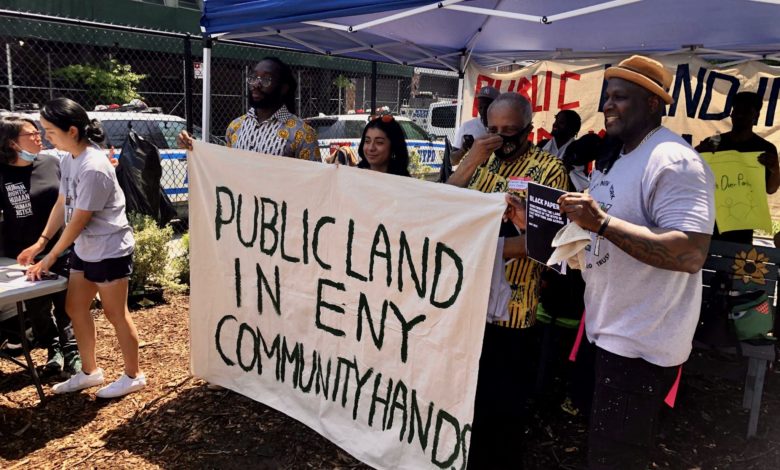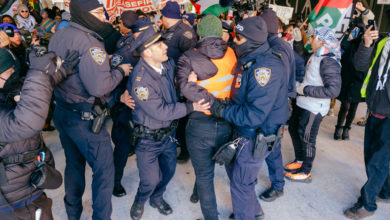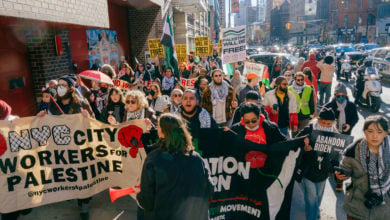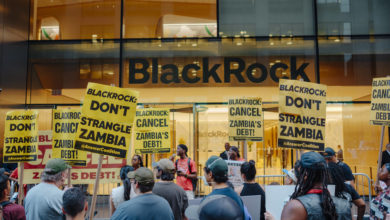
On May 21, organizers and activists gathered at the corner of Sutter Avenue and Linwood Street in the East New York neighborhood of Brooklyn to demand community ownership of the New York Police Department parking lot across the street. East New York Community Land Trust organized the rally, and it was attended by organizations such as the Party for Socialism and Liberation, the Bushwick Cooperative Credit Union, Western Queens Community Land Trust, East Harlem/El Barrio Community Land Trust, Picture the Homeless and local politicians, such as City Council members Charles Barron and Sandy Nurse.
The lot is owned by the New York City Department of Housing Preservation and Development and is directly across from an NYPD station, which uses it to park its vehicles. Local police have overtaken community lots, taking away parking spots from community members that live and work in those neighborhoods. According to the ENY CLT’s “Black Paper,” which was released the day of the rally, there are over 145 vacant lots used by the NYPD, and of these, 73 lots have in total 1.3 million square feet across Brooklyn and the Bronx that have potential to be converted into community land trusts — nonprofit organizations overseen by community residents that treat land as a public good. A cluster of 11 lots are in East New York’s Industrial Business Zone — the highest concentration of NYPD land in the neighborhood. ENY CLT is fighting to acquire the titles to some of these lots, which they hope to transfer to community ownership.
ENY CLT’s report argued that the lots would be put to better use for affordable housing, a sentiment some community leaders echoed.
“The city has been surrendering scarce, developable vacant land to the NYPD for purposes … that do not house our neighbors,” stated Nurse. “Housing justice is directly tied with racial justice, as illustrated by the concentration of these misused lots in the same communities that are impacted by abusive policing. The city must act on its commitment and create and preserve deeply and permanently affordable housing in the communities that need it the most!”
‘Free the land!’
While the NYPD’s presence was a major point of agitation, organizers also pointed toward the need for land sovereignty: the determination of a community to use its land as they see fit. Currently, developers and capitalists hold the keys when it comes to determining what land in that community is used for. This is seen when large investment managers, such as BlackRock or Brookfield, purchase property across New York City to be developed into new unaffordable apartment buildings that seem to sprout up on a weekly basis.
“For too long, public land has been given to for-profit developers without any community input,” said Albert Scott, an organizer with ENY CLT. “Today we’re here to say that ends, especially for this lot across the street.”
Community leaders at the rally indicted capitalism and how it stood in direct opposition to land sovereignty.
“Land is the basis of freedom, said Malcolm X,” Barron, a former Black Panther and Pan-African leader, reminded the crowd. “We honor him today, and that’s why we are here in support of the East New York Community Land Trust — to take back East New York and bring permanent affordability. Free the land!”
Other speakers lamented how capitalists robbed communities of possibilities when drab, unimaginative solutions were employed. They reminded the crowd that land sovereignty empowered communities and emphasized how issues that every community in NYC faces — climate change, food deserts, business revitalization — could be solved through empowered people taking a stand.
Community determined to keep fighting
Currently, there are more than a dozen community land trusts like ENY CLT in New York City actively fighting HPD for fair allocation of city resources, such as more affordable housing, green spaces, and communal areas for communal needs. In 2022, ENY CLT has secured $3 million in funding to commence with these types of projects, an amount Barron referred to as “chump change.”
Organizers, however, remained determined to continue their battle for community land trusts across the city.
“We finance our own displacement through the tax system,” Albert quipped. “There is hope, but we need to fight today to turn our pain into our power!”





